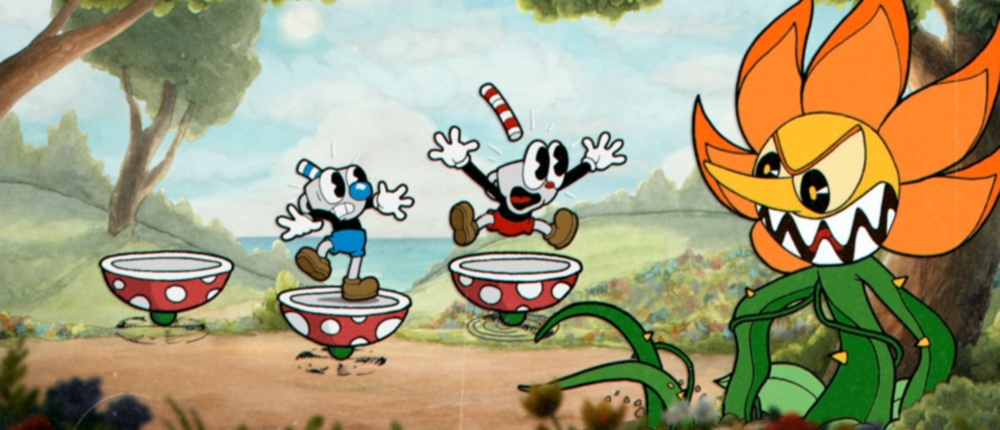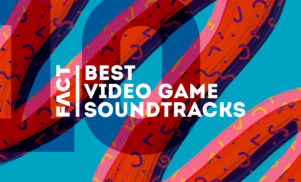It’s been another banner year for video games with a killer crop of soundtracks to match. FACT gamers Scott Wilson, Miles Bowe, Tayyab Amin and Lewis Gordon round up the most memorable scores of 2017.
Last year, the video game trends to watch were virtual reality and 4K graphics, and the battle lines were being drawn between Sony’s PS4 Pro and Microsoft’s Xbox One X. Now, at the end of 2017, things are far more blurred. The year has been dominated by Nintendo, whose Switch console rejects graphical grunt for a modular design that lets you play in front of the TV or on the toilet. You can’t do that with a VR headset.
Outside of hardware, games took more risks this year than they have in a long time. Nintendo redefined the open-world template with The Legend of Zelda: Breath of the Wild, Resident Evil 7 breathed new life into the franchise with a terrifying new perspective, PlayerUnknown’s Battlegrounds upended the online first-person shooter market with its ‘battle royale’ gameplay and the indie scene continued to innovate with games like Cuphead.
As ever, the games were accompanied by a strong selection of musical scores. Below you’ll find FACT’s best video game soundtracks of 2017, from Horizon Zero Dawn’s innovative twist on the big-budget orchestral formula to the junk-created sounds of Rain World.

10. Sonic Mania
Tee Lopes
(PagodaWest Games/Headcannon)
Sonic Mania designer Christian Whitehead wasn’t the only one facing a near-impossible challenge in returning Sega’s blue mascot to his 16-bit origins. Composer Tee Lopes was tasked with reimagining beloved Genesis-era themes from the series and coming up with new ones that could confidently stand with the classics.
Lopes exceeded expectations with supercharged updates to all-time greats such as ‘Green Hill’ and ‘Chemical Plant’, but it was new additions like the jazzy ‘Studiopolis’ and ‘Mirage Saloon’ that got stuck in our heads even more. A sequel seems inevitable at this point, and if Sega are smart they’ll bring Lopes back for Act 2. MB

9. Nidhogg II
Mux Mool, Geotic, Osborne, Doseone and Daedelus
(Messhof Games)
Nidhogg was one of 2014’s most inventive two-player games, pitting two pixelated swordsmen against each other in a perilous platform environment. The sequel amped up the idiosyncratic style and adrenaline-rush gameplay with a comedic change in art direction and new weapons system, while Mux Mool (Ghostly/Moodgadget) led a team of musicians soundtracking the surreal combat with a suitably fun score.
Also featuring music by Daedelus, Geotic, Osborne and Doseone, the soundtrack ranged from gentle house to IDM trips through raucous synth melodies and hip-hop loops, all of which help to bring out an emotional dynamic to the light-hearted – if gory – antics. For every moment lost in the intensity of each duel, you’ll have a moment to step back and take in just how charmingly absurd Nidhogg II – something that’s aided by the excellent variety of beats packed into its soundtrack. TA

8. Cuphead
Kristopher Maddigan
(Studio MDHR)
One of the year’s most visually striking games, Cuphead wears its 1930s influences on its sleeve. A retro run-and-gunner imagined as a Fleischer-style cartoon, its creators emphasize character design over plot and pack the game with dozens of boss fights, its cute but careless, cup-headed protagonist going up against hypnotist carrots, killer headstones and cosmic genies, each with their own theme befitting of the era.
Kristopher Maddigan’s score offers piano waltzes, ragtime bops, Prohibition-era big band stompers and plenty of memorable moments, such as the samba-meets-mambo-meets-Duke-Ellington fusion of ‘Floral Fury’. Almost all of the instrumentation was recorded live, sometimes with vintage mics and often multiple times with different solos, so whether you’re taking on Baroness Von Bon Bon for the fifth time or for the twenty-fifth, the thrill of the chase never dissipates. TA

7. Hellblade: Senua’s Sacrifice
Andy LaPlegua and David García Díaz
(Ninja Theory)
Andy LaPlegua, the singer of Scandinavian aggrotech band Combichrist, might not be the most obvious choice to handle the soundtrack for a sensitive portrayal of psychosis in the early medieval period. But together with David García Díaz, he crafted a soundtrack that subtly taps into the titular Senua’s fragile mental state.
Shifting from rhythmic pagan ritual music to austere cello and violin, it captures the sonic dimension of both her mindset and a Pictish society we know tantalizingly little about. In less prescriptive moments, the score is reminiscent of the folk horror of The Haxan Cloak’s early material. At its best, LaPlegua and Díaz’s work blends seamlessly with the stunning binaural sound design of Senua’s chattering internal voices. The result is unsettling, often frightening and wholly original. LG

6. Horizon Zero Dawn
Joris de Man, The Flight and Niels van der Leest
(Guerilla Games)
Horizon Zero Dawn is a rare thing in modern video games: a big-budget open-world game with a soul. Whether you’re stalking Watchers in the long grass or taking down a colossal Thunderjaw with a ropecaster, Aloy’s journey from young outcast to savior of humanity is a story that resonates long after the last collectables have been cleared off the map.
A big part of that is the soundtrack, which tugs on the heartstrings like any other Hollywood blockbuster score – albeit with much more character. The composers imagined what kind of music would be made by a primitive society in a ruined far future if they discovered our instruments, adding synthetic elements to represent the advanced robots that roam the landscape. It’s not short of memorable themes either. SW

5. Oikospiel
David Kanaga
(David Kanaga)
David Kanaga, the composer behind Proteus and Panoramical, has made a career out of playfully nudging the limits of what constitutes a video game. In those titles, his music was pushed to the fore, gently mutating according to the loose rules of the game. Oikospiel, his latest project and first produced entirely under his own name, is no less musical – though it’s significantly more deranged. Here, he imagines an opera composed by dogs.
With the canine protagonists battling for their labor rights as well as fighting climate change, Kanaga hurtles through a variety of styles, settling on something akin to an elastic, MIDI-obsessed Jim O’Rourke. It’s a joyfully disorientating experience, also boasting the most ingenious flip of Celine Dion’s ‘My Heart Will Go On’ you’re ever likely to hear (or play). LG

4. NieR: Automata
Keiichi Okabe, Keigo Hoashi
(Platinum Games)
Phenomenal writing, stunning landscapes and fluid shifts between gameplay styles puts NieR: Automata among 2017’s best games. It tells the story of a group of androids commanded to fight a proxy war in the far future, whose sense of awe at encountering a ruined Earth and discovering the nature of their own existence is delicately channelled by composer Keiichi Okabe with melancholy and wonder.
NieR: Automata is full of unforgettable scenes, such as stumbling into the view of a still-functioning amusement park, but it’s Okabe’s dazzling score that really sweeps you into the game’s post-apocalyptic world. Classical influences are deftly combined with industrial and electronic elements in a way that adds a warm, personal dimension to the robots inhabiting the planet while instilling an alien sense of unease to its astonishing natural environments. TA

3. The Legend of Zelda: Breath of the Wild
Manaka Kataoka and Yasuaki Iwata
(Nintendo)
What do you think of when someone mentions The Legend of Zelda? Chances are it’s Koji Kondo’s iconic ‘Overworld Theme’, which has, for better or worse, come to dominate the Nintendo franchise’s music for over 30 years. You won’t hear it much in BotW though; just like the countless shrines, Korok seeds and treasure chests dotted around Hyrule’s open world, it’s well hidden.
Manaka Kataoka and Yasuaki Iwata’s willingness to break with series convention isn’t just about putting tired themes to bed though. BotW is a game of simple moments, such as reaching the top of a hill and soaking up the view; the duo’s sparse and soothing soundtrack exists simply to let you appreciate the wonder on your own terms. It makes BotW one of the year’s most calming ambient experiences. SW

2. What Remains of Edith Finch
Jeff Russo
(Giant Sparrow)
With his first video game score, composer Jeff Russo delivered the same emotional heaviness and atmospheric tension he’s brought to some of TV’s bleakest shows, such as Fargo and The Night Of. He had his work cut out for him with What Remains Of Edith Finch, a decade-spanning exploration of a family doomed to meet untimely deaths, expect for one member cursed to live and carry on the cycle through a new generation.
“I really wanted to track the emotional journey of the family and to immerse the player within that experience,” he told us earlier this year. It was a devastating experience, to be sure, but Russo’s hypnotic score makes it hit harder. MB

1. Rain World
James Therrien and Lydia Esrig
(Videocult)
Set on a distant, post-human earth, the remains of looming mega-architecture and newly flourishing wildlife make up your playground in Rain World. Assuming the role of a hybrid animal called Slugcat, you must run, jump, crawl and slither your way past the other ravenous animals, out to get you as well as each other. It’s a beautifully eerie work punctuated by moments of heart-stopping danger, deftly aided deftly by James Primate and Lydia Esrig’s beautiful soundtrack.
Foregoing their usual chiptune style, the duo sourced sounds from real-life junk, building an audio library that might feasibly be found in the ruinous game world. In quieter moments, their music is delicate, decaying slowly with the surroundings, before clanging with smudgy, low-slung beats as the action escalates. It’s a worthy accompaniment to one of the year’s most compellingly realized game worlds. LG
Read next: What Remains of Edith Finch: Jeff Russo on his vivid video game score





























